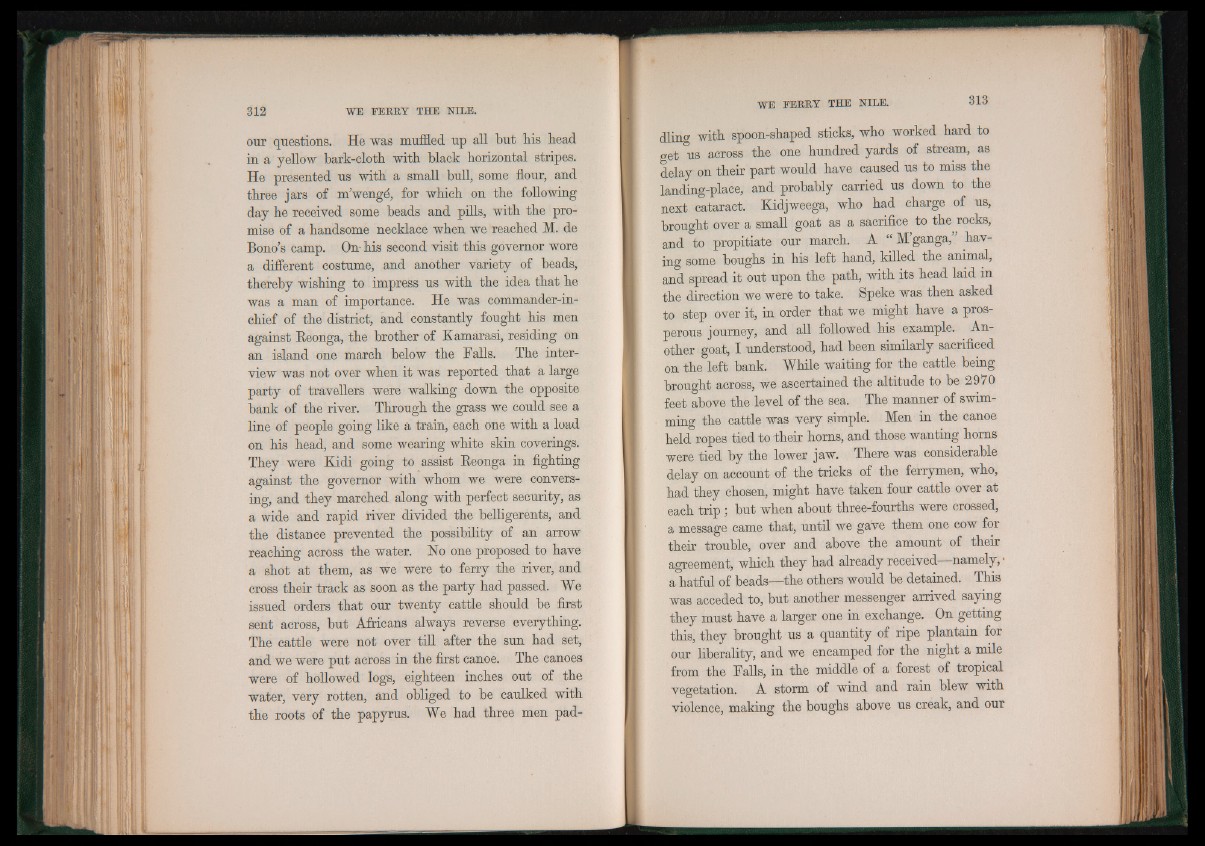
our questions. He was muffled up all but bis head
in a yellow bark-cloth with black horizontal stripes.
He presented us with a small bull, some flour, and
three jars of m’wengd, for which on the following
day he received some beads and pills, with the promise
of a handsome necklace when we reached M. de
Bono’s camp. On- his second visit this governor wore
a different costume, and another variety of beads,
thereby wishing to impress us with the idea that he
was a man of importance. He was commander-in-
chief of the district, and constantly fought his men
against Reonga, the brother of Kamarasi, residing on
an island one march below the Falls. The interview
was not over when it was reported that a large
party of travellers were walking down the opposite
bank of the river. Through the grass we could see a
line of people going like a train, each one with a load
on his head, and some wearing white skin coverings.
They were Kadi going to assist Reonga in fighting
against the governor with whom we were conversing,
and they marched along with perfect security, as
a wide and rapid river divided the belligerents, and
the distance prevented the possibility of an arrow
reaching across the water. No one proposed to have
a shot at them, as we were to ferry the river, and
cross their track as soon as the party had passed. We
issued orders that our twenty cattle should be first
sent across, but Africans always reverse everything.
The cattle were not over till after the sun had set,
and we were put across in the first canoe. The canoes
were of hollowed logs, eighteen inches out of the
water, very rotten, and obliged to be caulked with
the roots of the papyrus. We had three men padaiing
with spoon-shaped sticks, who worked hard to
get us across the one hundred yards of stream, as
delay on their part would have caused us to miss the
landing-place, and probably carried us down to the
next cataract. Kidjweega, who had charge of us,
brought over a small goat as a sacrifice to the rocks,
and to propitiate our march. A “ M’ganga,” having
some boughs in his left hand, killed the animal,
and spread it out upon the path, with its head laid in
the direction we were to take. Speke was then asked
to step over it, in order that we might have a prosperous
journey, and all followed his example. Another
goat, I understood, had been similarly sacrificed
on the left bank. While waiting for the cattle being
brought across, we ascertained the altitude to be 2970
feet above the level of the sea. The manner of swimming
the cattle was very simple. Men in the canoe
held ropes tied to their horns, and those wanting horns
were tied by the lower jaw. There was considerable
delay on account of the tricks of the ferrymen, who,
had they chosen, might have taken four cattle over at
each trip ; but when about three-fourths were crossed,
a message came that, until we gave them one cow for
their trouble, over and above the amount of their
agreement, which they had already received namely, *
a hatful of beads—the others would be detained. This
was acceded to, but another messenger arrived saying
they must have a larger one in exchange. On getting
this, they brought us a quantity of ripe plantain for
our liberality, and we encamped for the night a mile
f r om the Falls, in the middle of a forest of tropical
vegetation. A storm of wind and rain blew with
violence, making the boughs above us creak, and our